ORGANIC Coconut oil
virgin
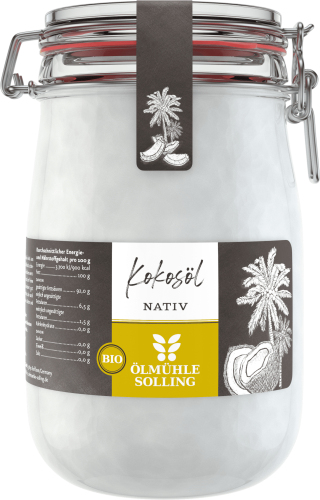

Non-EU-agriculture
- 100 % virgin organic coconut oil
- from recognized organic cultivation / EC organic quality
- highest premium quality from the Philippines
- not refined, not hardened, not bleached, not deodorized
- residue-controlled by accredited laboratories in Germany
- VEGAN and lactose-free, lauric acid content 49.5 g per 100 g
from 6618 ratings






The virgin coconut oil from Ölmühle Solling comes from fully ripe coconuts from organic farmers in Sri Lanka and the Philippines. The coconut flesh is gently dried and processed fresh from the mill into coconut oil without the brown seed coat. Coconut milk can also be obtained from the flesh of the coconut.
The valuable oil from the exotic nut is not only of the highest quality in terms of taste and versatile in use, it also has impressive nutritional values: although coconut oil contains many saturated fatty acids, it is a special type of fatty acid. The oil consists largely of medium-chain fatty acids, known as MCTs (medium chain triglycerides), such as lauric acid. This lauric acid, which makes up almost half of the fatty acids in coconut oil, is an important component of breast milk, among other things. Combined with a varied diet, organic coconut oil makes an important contribution to a balanced diet.
Coconut oil is sometimes also referred to as coconut fat. The condition and designation of coconut oil or coconut fat have something to do with the storage temperature. The oil is liquid at temperatures above 24°C. At lower temperatures below 24°C, coconut oil solidifies.

The difference between coconut oil with and without seed coat
The snow-white coconut oil differs from our "whole nut coconut oil": while the latter is made from the coconut together with its brown seed skin, this skin is removed for the pressing of "conventional" coconut oil. It is therefore milder in taste, has a less intense fragrance and is also recognizable by its snow-white color. Due to the processed seed skin, the "coconut oil from the whole nut" has a slightly creamier, slightly yellow color.
The production of virgin organic coconut oil is complex and requires a great deal of care and expertise, as this valuable oil differs significantly in both taste and composition from cheap, hardened coconut fats used in the food industry or available in conventional stores.
Our coconut oil impresses with its premium quality and delicious taste. It is naturally vegan, is not hydrogenated or deodorized and is very versatile. Coconuts are a highly nutritious food. They are rich in fiber, vitamins, minerals and phenolic compounds. The edible coconut flesh consists of around 45% water. It also contains around 35 % coconut fat, 9 % fiber, 5 % protein, 5 % carbohydrates and 1 % vitamins and minerals.
Coconut flour as a fiber-rich by-product
In addition to coconut oil, a high-fiber coconut flour can also be produced from ripe organic coconuts. To do this, the freshly harvested coconut flesh is gently dried, de-oiled by mechanical pressing and then ground. The coconut oil content is reduced to approx. 18 g per 100 g through the pressing process. The carbohydrate content is 21 g and the protein content is approx. 17 g per 100 g. However, the fiber content is remarkably high (35 g per 100 g). Coconut flour therefore has a high swelling capacity and binds up to 60 % water.
Coconut flour is ideal for preparing dough for cakes and pastries. You can save 20-25% of cereal flour in any recipe by using coconut flour. Coconut flour is also a natural source of potassium. The potassium content (approx. 1750 mg per 100 g) is seven times higher than the sodium content. The minerals make up a total of around 5 g per 100 g of flour.
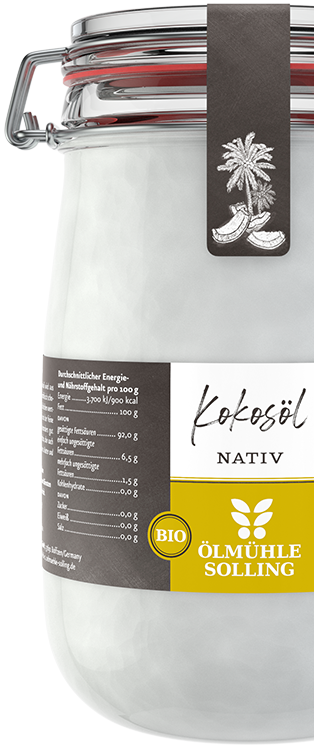
Valuable coconut oil
7 How to use coconut oil


- 1 for frying, baking, steaming and deep-frying
The oil from the coconut is ideal for hot temperatures and is particularly heat-stable due to its fatty acid composition. more - 2 as a butter substitute
Coconut oil contains protein, vitamins, minerals and fiber. Its creamy consistency makes it ideal as a spread and butter substitute. - 3 for skin care
Natural coconut oil is the ideal moisturizer for all skin types. It penetrates the skin quickly and stays there longer than water-based creams. more - 4 for hair care
Coconut oil is a real talent when it comes to hair care: with its moisturizing effect, it provides hair and scalp with sufficient care and protection against environmental influences. more - 5 for lip care
As a natural lip care product that is completely free from colorants and fragrances, coconut oil leaves the skin feeling soft and nourished. It also removes long-lasting lipstick and cares for the sensitive skin of the lips as well as cleansing them. more - 6 for the care of mouth and teeth
The oil is also used in the Ayurvedic method of oil pulling to cleanse and care for the mouth and teeth. Coconut oil is antibacterial and leaves the mouth feeling clean and pleasant. more - 7 for four-legged friends
Coconut oil is not only popular for humans, but also for dogs and cats as a valuable food supplement and for coat care. Ticks and fleas do not like coconut oil, so it is said to provide natural protection against vermin. more
Coconut oil for cooking
Nowadays, it is hard to imagine cooking without coconut oil, especially in countries where coconuts thrive. The exotic organic coconut oil is a very insensitive and heat-resistant oil that is rich in valuable lauric acid. The oil owes its heat resistance primarily to the high proportion of saturated fatty acids, which make it durable and heat-stable and prevent the formation of trans fatty acids during frying, baking and deep-frying.
In addition to the numerous applications of coconut oil, the oil is also popular for its fine, nutty taste. It is suitable for curries, meat and fish dishes, vegetarian and vegan dishes and, of course, for sweet dishes. Coconut oil can replace butter in baking and is also suitable as an alternative spread, on its own or under cold cuts, jams and honey. You can find inspiration in our recipe collection.
Nutrient-rich coconut oil
At Ölmühle Solling, we offer the highest quality organic coconut oil, known as virgin coconut oil. This is obtained mechanically from fully ripe, organically grown coconuts without the addition of heat, gently bottled and, of course, not bleached, deodorized or refined. It impresses with its fine coconut flavor and a wealth of nutrients.
Coconut naturally provides protein, carbohydrates, fiber, vitamins and minerals. It contains medium-chain fatty acids, known as MCTs (medium chain triglycerides), such as lauric acid, which makes up almost half of the fatty acids in the oil. In combination with a varied, fresh cuisine, organic coconut oil with its lauric acid content makes an important contribution to a balanced diet.
As coconut oil does not contain any essential polyunsaturated fatty acids, a balanced diet should be based on the versatile use of oils. Vital oils in particular, such as our freshly milled linseed oil and our omega DHA oils, provide essential omega-3 fatty acids such as alpha-linolenic acid and docosahexaenoic acid. That's why we offer you a large selection of freshly milled organic cooking oils for oil changes in the kitchen.
The coconut oil production process
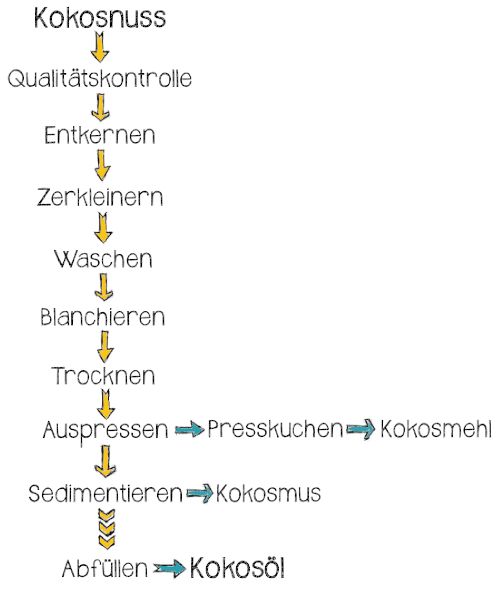
The production of high-quality coconut oil naturally begins with checking the quality of the nuts. Only nuts of analytically and sensory flawless quality from controlled organic cultivation are used for the production of our coconut oil.
The hard nut shells are removed by hand by trained workers. Once the coconut has been shelled, the coconut water is first collected from the inside of the nut. Once the nut has been opened, further processing must be carried out quickly. In the next step, the flesh is removed from the shell, also by hand.
The fresh coconut flesh is then chopped into fine grated coconut using stainless steel cutters. We also offer the aromatic grated coconut in unprocessed form at Ölmühle Solling. An important process must be carried out before the virgin coconut oil can be pressed in order to guarantee the shelf life of the organic coconut oil. The washed, grated coconut meat must be "blanched" with hot air. This process only takes a few minutes, and the temperatures of the drying hot air must reach at least 80 °C and must not be lower. The reason for the importance of blanching is that coconut meat contains natural enzymes, known as lipases, which can break down fats. If these enzymes are not inactivated by the effect of heat, the coconut oil, which is rich in lauric acid, would quickly acquire a soapy taste. In addition, the water content of the coconut meat is reduced to less than three percent in the drying plant. The dried coconut meat is known as "copra". Once it has been blanched and dried well, the copra can be processed directly into virgin coconut oil.
The production of coconut oil also has a plus point in terms of sustainability: no waste is produced during the processing of the coconut and every part of the valuable foodstuff is used: The press cake left over from the pressing process is ground into a fine coconut flour in our oil mill. It is suitable for baking and enriching shakes and muesli. After the freshly pressed coconut oil has been bottled, the precious coconut puree, which remains in the barrel as sediment, is also bottled and can be used as a delicious spread.
Monkey Free Statement - Monkey-free coconut harvesting
We guarantee that monkeys are not used at any time when harvesting the nuts for our organic coconut oil. An animal-free coconut harvest is a prerequisite for our choice of supplier. The organic coconuts are harvested by adult men who are fully trained for this work. The nuts are harvested using long poles fitted with a sickle. We also guarantee that no animal testing is used in the development and production process of our natural cosmetics.
Skin care with coconut oil
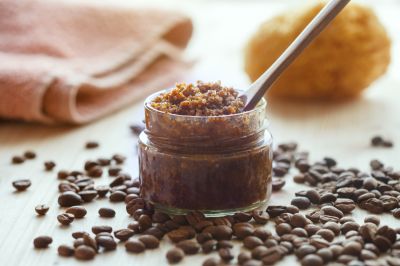 A scrub with coffee powder and coconut oil
A scrub with coffee powder and coconut oilCoconut oil is a rich and moisturizing skin care product. In our Solling natural cosmetics, coconut oil is an important ingredient that not only cares for the skin but also surrounds the other valuable plant oils with its protective coating of saturated fatty acids.
Coconut oil pampers the skin and senses with an exotic fragrance and is well tolerated. It gives our skin balms a pleasant texture and a nourishing effect that also helps dry skin to retain moisture for a long time. Coconut oil also provides care and moisture when applied pure to the skin. Coconut oil contains natural antioxidants, protects the skin from free radicals and prevents skin ageing. Coconut oil is also ideal as an additive in bath water and for mixing homemade scrubs.
Our tip for an invigorating body and face scrub with coconut oil:
3 tsp coconut oil
2 tsp ground coffee
1 teaspoon of coconut blossom sugar
Coconut oil to remove make-up

Coconut oil is also suitable for removing make-up. To use, simply moisten a make-up removal pad with lukewarm water, add a little coconut oil and lightly wipe over skin, lips and eyelashes. Washable make-up remover pads made from bamboo or organic cotton are reusable and resource-friendly. In addition to cleansing, the skin is nourished and revitalized in the same step.
Baby care with coconut oil
Coconut oil is also a real insider tip for the care of sensitive baby and children's skin. It is 100% free from synthetic additives, i.e. contains no colorants, fragrances or preservatives and is very well tolerated. Coconut oil can be used pure as a daily cream and also provides long-lasting care for dry and irritated skin. Coconut oil is also suitable as a nourishing additive in bath water. Please clean the bathtub thoroughly after bathing to avoid the risk of slipping.
Lip care with coconut oil
Organic coconut oil is ideal care for delicate lips. The oil has a pleasant fragrance and acts as a natural protective layer for the sensitive skin of the lips. At the same time, it leaves a smooth shine. You can also use coconut oil to make your own exfoliating scrub for soft, nourished lips:
½ tsp coconut oil
½ tsp coconut blossom sugar or coffee powder
½ tsp honey
Mix coconut oil, coconut blossom sugar or coffee powder and honey together, apply and massage gently over the lips for one to two minutes. Rinse off with water and pat dry with a soft towel. This gently removes dead cells and revitalizes and nourishes the skin. The peeling will keep in the fridge for about a week.
Oil pulling with coconut oil
 Oil pulling cleanses the mouth, tongue and teeth
Oil pulling cleanses the mouth, tongue and teethOil pulling, oil chewing or oil souring is the term used to describe cleaning the mouth with oil. It is a method from Ayurvedic medicine, a traditional Indian art of healing. Oil pulling involves moving a small amount of oil back and forth in the mouth for around 10 minutes. This is used for oral hygiene and is intended to remove bacteria and other pathogens from the mouth and therefore from the body.
The best time for oil pulling is in the morning, directly after getting up. Before starting, remove plaque from the tongue with a tongue scraper. This reduces the number of bacteria that accumulate in the oil. Instead of a tongue scraper, you can also use an inverted tablespoon. Simply swipe it carefully over the tongue two or three times from back to front. Then rinse your mouth with a little water. Only brush your teeth after oil pulling.
For oil pulling, put about a teaspoon of coconut oil in your mouth, let it melt there and move the oil back and forth, similar to a mouthwash. Pull the oil between your teeth and wet your entire mouth. As oil pulling stimulates saliva production, the amount of mouth contents increases. The oil dissolves food residues, bacteria and other microorganisms from the teeth, tongue and oral mucosa and absorbs them.
Important: At the end of oil pulling, do not swallow the oil under any circumstances, but spit it into a handkerchief and throw it away afterwards. It is recommended that you brush your teeth after oil pulling. After just a few applications, you will notice that your oral mucosa feels softer and your teeth smoother.
Hair care with coconut oil

Organic coconut oil is a natural and popular hair care product. The oil has a nourishing effect and provides both hair and scalp with moisture. A treatment with coconut oil is particularly recommended for dry and damaged hair. The advantage over synthetic hair treatments is that virgin organic coconut oil is virgin, contains no silicones, artificial fragrances or stabilizers and therefore does not irritate the hair or skin. In addition to vitamins, it contains a variety of minerals that nourish and revitalize the hair and strengthen and protect it against external environmental influences.
Using coconut oil as hair care is simple: depending on the length of your hair, rub one to two teaspoons of coconut oil into the palms of your hands, allow to melt and apply to dry or towel-dried hair. Massage the oil thoroughly into the lengths and ends with your fingertips and ideally also wet the scalp with it. The next step is to carefully comb through longer hair with a comb to distribute the oil more thoroughly. In order to achieve a good effect and ensure that the coconut oil remains liquid, the hair should be wrapped in a towel so that it remains warm due to body temperature and left to work in for half an hour to an hour. Of course, you can also leave the oil on overnight, but please protect your pillow from oil stains with a towel. After the desired exposure time, the hair is first rinsed thoroughly with warm water and then washed with a mild, ideally silicone-free shampoo and can be dried and styled as usual.
Coconut oil for pets
Coconut oil has also proven to be a high-quality feed supplement and coat care product for pets such as dogs and cats. It is even said to provide natural protection against vermin, as ticks and fleas avoid the sweet scent of the oil. Depending on the size and weight of the animal, cats can be given ¼ to ½ teaspoon of coconut oil several times a week. Large dogs can be given a full teaspoon daily. Simply mix the oil into the wet or dry food. The oil can be applied to the coat to repel vermin. To do this, melt the coconut oil in the palms of your hands and spread it on the animal's coat, especially on the belly. As coconut oil does not contain any synthetic ingredients, it is completely safe for your pet to lick the oil off.
The coconut palm

For thousands of years, the inhabitants of South India, the South Sea islands and other tropical and subtropical regions have naturally benefited from the diversity of the coconut palm and its nuts. The palm provides building and fuel material, the high-quality coconut oil from the coconut nourishes the skin and hair, and a meal without an ingredient from the coconut is almost unthinkable.
The coconut palm is part of the palm family. It originated on the South Sea islands and in the Indomalayan region. The palm tree owes its spread along the coasts of the entire tropical belt between the Tropic of Cancer and the Tropic of Capricorn around the equator to the coconut. As this is buoyant, it has spread by sea. The coconut palm is also known as the Tree of Life, because in the tropics it has enormous economic importance as the most important crop and is also a basic source of nutrients.
Ölmühle Solling only processes organic coconuts from smallholder farms, from which coconut oil, coconut seasoning oils, coconut flour and coconut spreads are produced.
Coconuts from Sri Lanka
Founder and product developer of Ölmühle Solling, Werner Baensch, a qualified food technologist, worked for many years with the Coconut Research Institute in Sri Lanka. There he developed a process technology for the production of high-quality virgin organic coconut oil. This technology was presented for the first time at the international Coconut Conference in Colombo in 2003. It then spread to all tropical and South-East Asian countries. Since 2006, Ölmühle Solling has been working with Serendipol, one of the newly established coconut oil projects in Sri Lanka, on technical design and quality control.
Serendipol has been working with smallholder farmers in the Kuliapitiya area since its establishment in 2006 and supports them in the organic cultivation of coconut farms. Over the years, more than 1,300 smallholders and farmers have joined the project, managing and cultivating a total area of over 8,000 hectares.
In addition to coconut palms, the many organic plantations also grow other crops for daily subsistence. This mixed cultivation contributes greatly to the fact that organic farming can be sustainable in many areas of life under these tropical climatic conditions. For the locals, this means secure jobs in coconut processing and thus improved living conditions and opportunities for future generations.
Coconut oil - solid or liquid?
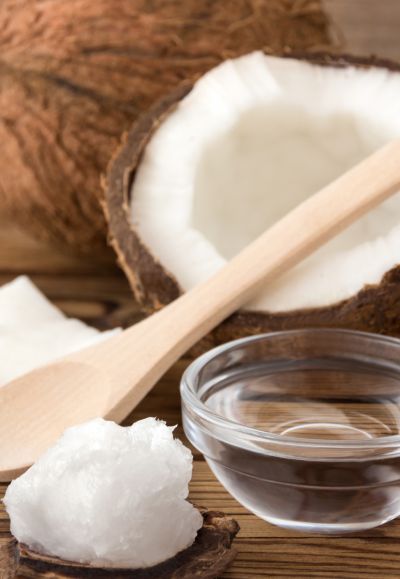 Coconut oil can be solid or liquid
Coconut oil can be solid or liquidWhen traveling to tropical regions such as Thailand, the Philippines or Sri Lanka, you often discover clear, liquid coconut oil that looks like water. Back in Germany, the coconut oil is suddenly no longer liquid, but solid. Why is that?
The physical state and the name of coconut oil or coconut fat have something to do with the storage temperature. The oil is made from the dried flesh of the coconut and is usually liquid at temperatures above 24 °C. At lower temperatures below 24 °C, the oil solidifies. At lower temperatures below 24 °C, the oil solidifies. For this reason, the term coconut oil is also correct. However, as the product is almost invariably referred to as coconut oil in the tropical countries of origin and the term is used worldwide, we at Ölmühle Solling also use this term.
It is often wrongly assumed that coconut fat is always solid and coconut oil liquid and that they are two different products. However, depending on the outside temperature, only the aggregate state differs. Virgin, untreated coconut oil contains a high proportion of medium-chain fatty acids, also known as MCTs (medium chain triglycerides), which include caproic, caprylic and capric acid as well as lauric acid. The former have a lower melting point than 24 °C and change their aggregate state with increasing or decreasing temperature.
A virgin, organic coconut oil liquefies at a temperature of around 24 °C and takes on a transparent, water-like appearance. At temperatures below 24 °C, the oil becomes solid. It remains spreadable and takes on a creamy white color. At very low temperatures, e.g. in the refrigerator, the oil becomes extremely solid and loses its spreadability. We recommend that you store the coconut oil outside the refrigerator.
Recipe
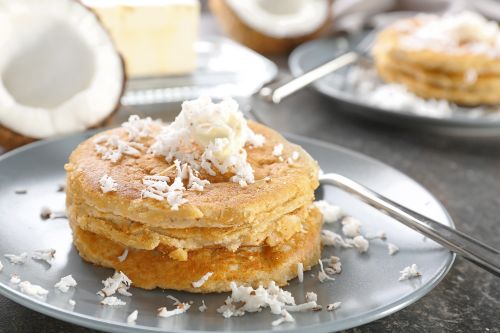
Pancakes with coconut flour
Simple recipe for pancakes with coconut flour and coconut oil. The cane sugar can be replaced with agave syrup. Sprinkle with coconut rasps before serving. zum Rezept
Coconut cake with raspberries
Tasty cake recipe without wheat flour and industrial sugar. With coconut rasps, raspberries, dates and coconut flower sugar. zum Rezept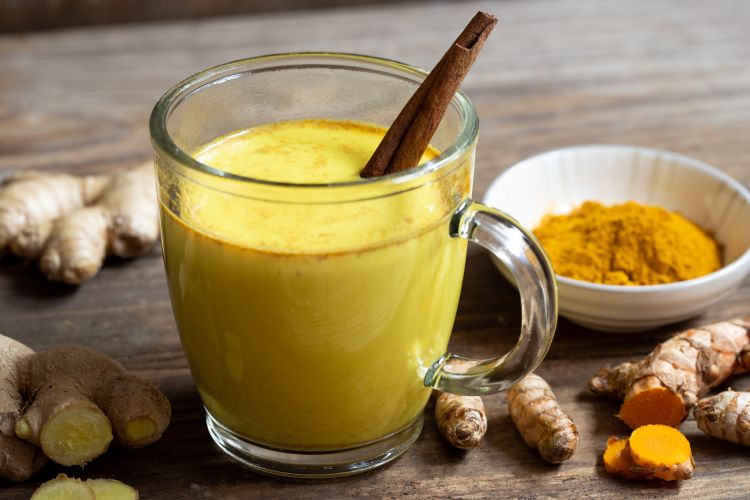
Golden Milk
Golden Milk is a traditional drink with turmeric and oriental spices. An easy recipe for the popular detox drink. zum Rezeptweitere Rezepte
Ratings
Specification and ingredients
Coconut oil
Average energy and nutrient content for 100 g
Please enjoy our products as part of a diverse and balanced nutrition.
As a product of nature the composition of the oil can vary, the given specifications are therefore average values.
Ingredients
Coconut oil, certified organicDurability
15 - 18 monthsLagerung
Store in a cool and dark place. Spreadable at room temperature.Fatty acids diagram

Botanical name: cocos nucifera L.
Organic coconut oil should be stored in a dark, dry place protected from light at temperatures of 10 - 20°C. Under optimal conditions it will keep for up to 18 months.
The sealing ring of the 1 liter jar is made of pure natural rubber.
Fatty acid composition of the virgin coconut oil:
6:0 caproic acid 0.7 %
8:0 caprylic acid 4.6 - 10.0 %
10:0 capric acid 5.0 - 8.0 %
12:0 Lauric acid 45.1 - 53.2 %
14:0 Myristic acid 16.8 - 21.0 %
16:0 Palmitic acid 7.5 - 10.2 %
18:0 Stearic acid 2.0 - 4.0 %
18:1 Oleic acid 5.0 - 10.0 %
18:2 Linoleic acid 1.0 - 2.5 %
Caproic acid, caprylic acid, capric acid and lauric acid are also referred to as medium-chain fatty acids and are summarized as middle chain triglycerides(MCT). The MCT content of virgin coconut oil is approx. 16 %.
The values given are average values and are subject to natural biological fluctuations, as the fat composition depends on the climate, soil conditions and degree of ripeness.
Regulation (EC) No. 1924/2006 of the European Parliament restricts nutrition and health claims made on foods. As of December 12, 2012, it will no longer be possible to refer to the nutritional and physiological effects of foods and food supplements. (Only the pharmaceutical industry is now allowed to do this. )
Coconut oil (not only) for the brain ISBN 978-3-942772-38-9
The best of the coconut ISBN 978-3-942772-56-3
Positive things about fats and oils ISBN 978-3-942772-57-0





 Coconut oil
Coconut oil Coconut butter
Coconut butter Coconut flower sugar
Coconut flower sugar Coconut milk
Coconut milk